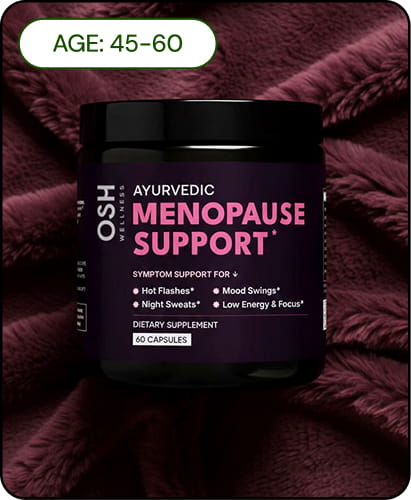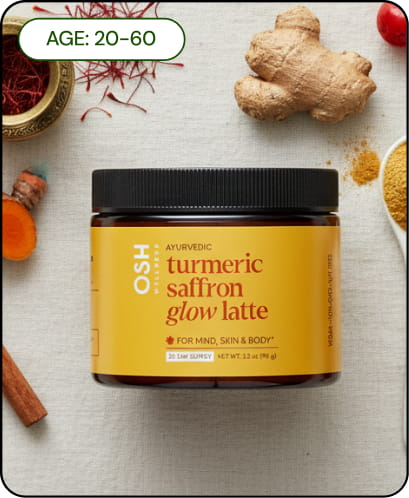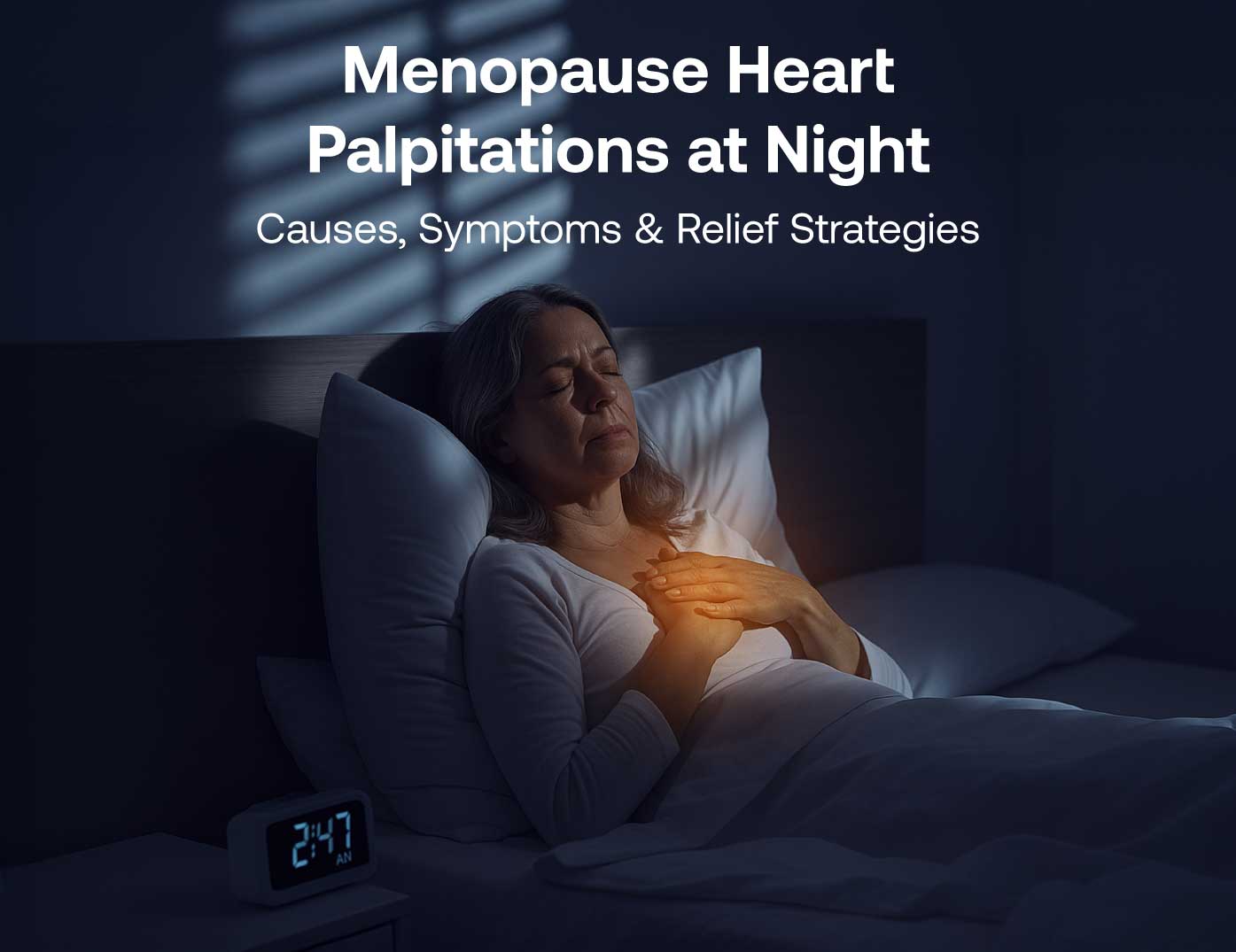Table of contents
I know it might feel early to start talking about the holidays, but trust me, what we do in the next few weeks can make a huge difference in how our bodies handle stress later on.
Because let’s be honest: the holidays can be a lot. The planning, the family expectations, the travel, the social obligations, the food, the disrupted sleep, it all piles up. And if you’re in your 40s or 50s, already riding the hormone rollercoaster of perimenopause or menopause, those extra stressors hit differently. Our tolerance for “pushing through” shrinks. (Some might say we have fewer fcks to give, and they wouldn’t be wrong.)
But beneath that mix of irritability, fatigue, and anxiety is something very real and physiological: cortisol, our main stress hormone. When cortisol levels become too high for too long, or fluctuate between highs and lows, it affects everything: our mood, digestion, metabolism, sleep, energy, and even how we experience joy and connection.
And for women in midlife, this effect is amplified. As estrogen and progesterone fluctuate or decline, our stress response becomes more sensitive. Suddenly, things that felt manageable before, like family gatherings or a chaotic schedule, can send us into overdrive.
Add to that the gut-brain connection: chronic stress impacts digestion and the microbiome, which loops back into mood, hormones, and immune function. It’s all interconnected.
That’s why I’m a big believer in building your cortisol buffer, and starting now.
What is a Cortisol Buffer?

Cortisol is often referred to as the body’s stress hormone, but it does so much more than respond to stress.
It supports energy, digestion, sleep, immunity, and hormone balance. When cortisol swings too high or too low, these systems can feel out of sync. (1)
Think of your cortisol buffer like a savings account. Every nourishing choice, good sleep, steady blood sugar, rest, time in nature- is a deposit. Every stressor, lack of sleep, skipped meals, caffeine overload, and overcommitment is a withdrawal.
The goal isn’t to avoid stress altogether (that’s impossible), but to strengthen your resilience so that when life does get busy or emotional, your hormones don’t go into overdraft.
Building that buffer takes intention, but it doesn’t have to be complicated. Small, consistent actions now will pay off in calmer holidays, better energy, and fewer “crash and burn” moments come December.
Support Your Cortisol with Consistent Habits
Below are some simple, evidence-based ways to nurture your cortisol buffer and support your body through the holiday season.
You don’t have to do everything; in fact, please don’t. Pick a few supportive practices and commit to them with consistency. This is about sustainable nervous system support, not perfection.
Sleep Hygiene
Sleep is when cortisol resets. (2)
Keep your sleep and wake times consistent, even on weekends.
Get natural light in your eyes within an hour of waking to anchor your circadian rhythm.
Dim the lights and screens at least an hour before bed.
Create a short, relaxing bedtime ritual, such as stretching, journaling, or sipping herbal tea.
Even small adjustments, like going to bed 15–30 minutes earlier, can have a noticeable impact on energy and mood.
Movement You Actually Enjoy
Cortisol thrives on rhythm, not extremes. Choose movement that feels nourishing: walks, dancing, yoga, Pilates, resistance training. The key is consistency and joy, not necessarily intensity.
Blood Sugar Balance = Cortisol Balance
This one’s huge. Every time your blood sugar spikes and crashes, cortisol jumps in to save the day, and over time, that wears you down. (3) The simplest, most effective strategy is to pair any indulgent treat with protein, healthy fat, or fiber. This helps slow digestion, prevent spikes and crashes in blood sugar, and keeps your energy steadier.
Here are some other tricks to ensure stable blood sugar:
Eat regular meals, no skipping breakfast or lunch.
Prioritize protein at every meal and snack.
Add complex carbs and fiber (think root veggies, oats, lentils) to feed your gut and support serotonin.
Limit refined carbs, sugar, and alcohol, and if you do indulge, pair them with protein, fat, or fiber (like nuts, cheese, or veggies).
Focus on anti-inflammatory foods like colorful produce, olive oil, avocado, and fatty fish.
Watch the caffeine, especially on high-stress days. Too much coffee pushes that cortisol button and disrupts sleep later.
Supplements that can help
(These are general options I use often in practice; talk to your provider about what’s right for you.)
Magnesium threonate or glycinate: for nervous system calm and muscle relaxation. (4)
L-theanine: supports relaxation, especially after a stressful day or late night, without making you drowsy. (5)
Adaptogens like Rhodiola or Schisandra: herbs that help your body adapt to stress and balance energy.
These are not meant to replace lifestyle habits; they work best when paired with balanced meals, consistent sleep, and stress-management practices. They are supplemental to give your body extra support when the holiday season pushes your limits.
Support Your Nervous System

Stress isn’t just mental, it’s physiological. The way we breathe, move, and connect with others directly impacts cortisol regulation.
Try weaving in micro-moments of calm throughout the day:
Breathe: 3–5 slow breaths before opening emails, driving to work, or while waiting in line. (6)
Pause: Stretch your hips, or close your eyes for a few moments.
Ground: Step outside barefoot, notice the air on your skin, listen to the birds.
Connect: Call a friend, hug your partner, share a meal without your phone nearby.
I tell my patients: I’d rather you take a few 3-minute breath breaks each day than meditate once a week for 30 minutes. Consistency is what rewires your nervous system for calm.
Honor Hormonal and Cycle Shifts
Even if yourperiods are irregular or winding down, your hormones still fluctuate, and they influence how you handle stress.
When progesterone dips (right before your period or during perimenopause), your stress resilience drops too. That’s when you might notice more irritability, cravings, anxiety, or poor sleep.
That’s your cue to double down on your cortisol-supporting habits. I learned about the 1% rule from my mentors at the Red School – small changes that can completely shift your trajectory. If a sailor changes course by just one degree, they end up in a completely different place.
Here are a few “1% shifts” to try before your period or during stressful weeks:
Go to bed 30 minutes earlier.
Take a 15–30-minute walk after dinner.
Rest after work by lying down or doing a short breathwork meditation instead of scrolling.
Don’t skip meals, ever 😘
Choose one or two cortisol-supporting habits and stay consistent with them for the week.
Listening to your body and honoring its rhythms means you can tailor your habits to your hormonal cycle, making your cortisol buffer stronger and your daily energy more balanced.
These small tweaks compound. You’ll notice steadier moods, fewer cravings, and more energy over time. And you’ll navigate the holiday season with greater ease, steadiness, and confidence.
Setting Boundaries and Planning Ahead

Let’s talk about boundaries and intention, two words that can transform your experience of the holidays.
Start now, not in the thick of it.
Schedule downtime like you would an appointment. Protect it.
Plan meals so you’re not relying on snacks or sugar to get through.
Normalize saying “no.” You don’t have to attend every event or host every gathering. Boundaries are a powerful hormone support. When you honor your limits, you can show up more fully for the events and people that truly matter.
Align your choices with your values. Ask yourself: Does this add meaning, joy, or connection, or just obligation?
We might not be able to get out of every obligation, but even small steps go a long way. Saying “yes” selectively, carving out rest, or taking five minutes for yourself can make a meaningful difference for your energy and cortisol levels.
Your body feels it when you’re overextended. Protecting your energy isn’t selfish, it’s essential hormone care.
The Takeaway: Start Building Now for a Healthier Holiday Season
Your cortisol buffer isn’t built overnight, it’s built moment by moment, choice by choice. Every balanced meal, every early bedtime, every deep breath is a deposit into your hormonal resilience account.
By starting now, you’ll head into the holidays not on an empty tank, more grounded, more energized, and more able to enjoy the connection and joy this season can bring.
Remember, this is not about perfection. It is about consistent, gentle attention to your needs.
Because the goal isn’t to get through the holidays, it’s to feel good through them.
While small daily habits are powerful, support from others can make a big difference. My team and I are here to guide you with one-on-one sessions tailored to your unique needs or through group experiences that provide community and shared learning.
By combining your daily practices with personalized or group support, you can enter the holiday season feeling more resilient, calm, and empowered than ever before.








